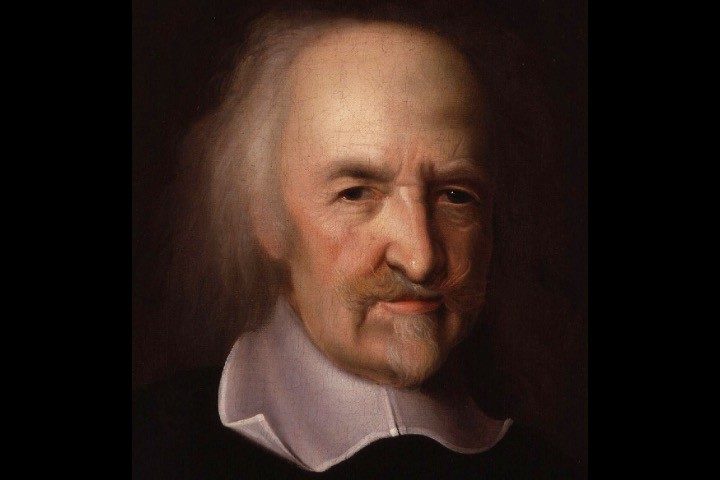
“The right of nature … is the liberty each man hath to use his own power, as he will himself, for the preservation of his own nature, that is to say, his own life.” — Thomas Hobbes
Thomas Hobbes was an influential philosopher who lived during the 17th century. He is universally ranked as one of the founders of modern political philosophy, and is best known for his book Leviathan, named for the serpent so named in the Old Testament.
In his book, Hobbes’ “Leviathan” refers to an artificial person or political entity created by the social contract, which is the agreement by which individuals surrender their individual rights and submit to the authority of a sovereign in exchange for protection and security. The Leviathan is thus a symbol of the sovereign state responsible for maintaining order and stability in society. Since the publication of Leviathan in 1651, the word Leviathan has been used to describe other large and powerful entities as well, such as corporations or other institutions that exert significant influence and control over society.
Hobbes argued that Leviathan, far from being an evil to be overcome, was necessary to ensure perpetuation of the commonwealth. He believed that human beings are fundamentally selfish and violent, and that without a strong government to keep them in check, life would be “solitary, poor, nasty, brutish, and short.” In Leviathan, Hobbes presented his thesis under three principal headings: state of nature, the social contract, and sovereignty.
State of Nature
For Hobbes, the state of nature is the hypothetical condition of human beings before the establishment of society and government. This could be thought of as near the beginning of the creation of man by God, or in the beginnings of other primitive societies. In this state, there is no law, no property, and no justice. Human beings are free to act as they please, but their freedom is limited by the fact that they must compete with one another for resources. According to Hobbes, the state of nature is a state of war in which each individual is at risk of being harmed by others.
Hobbes believed that the state of nature is characterized by constant fear and insecurity. In such a state, human beings are constantly in danger of being attacked or killed by others. He argued that this state of nature is the reason people come together to form societies and governments. According to Hobbes, the desire for self-preservation is the primary motivation for human beings to form societies and governments.
Social Contract
Hobbes’ social contract theory is one of his most significant contributions to political philosophy. He believed that people enter into a social contract with one another, in which they surrender some of their individual rights in exchange for the protection and security provided by the government. In Hobbes’ view, the social contract is a voluntary agreement between individuals to give up some of their rights in exchange for the benefits of living in a society.
According to Hobbes, the social contract creates a commonwealth, or a state, in which the government has the power to make and enforce laws that protect the common good. The social contract is binding on all individuals within the commonwealth, and those who violate its terms are subject to punishment by the government. Hobbes believed that the social contract is necessary for the preservation of society and the protection of individual rights, and one’s mere existence in a country is a tacit endorsement of the social contract.
Sovereignty
Hobbes’ conception of sovereignty is closely linked to his ideas about the social contract. He believed that the sovereign, or the person or group holding ultimate political power within the commonwealth, is responsible for maintaining social order and protecting individual rights. In Hobbes’ view, the sovereign has absolute authority over the people within the commonwealth, and his power is not subject to review or appeal.
The sovereign has the power to make and enforce laws, to administer justice, and to protect the common good. Hobbes believed that the sovereign’s authority is necessary for the preservation of social order and the protection of individual rights.
The Internet Encyclopedia of Philosophy summarizes Hobbes’ position on this point this way:
He poses stark alternatives: we should give our obedience to an unaccountable sovereign (a person or group empowered to decide every social and political issue). Otherwise what awaits us is a state of nature that closely resembles civil war — a situation of universal insecurity, where all have reason to fear violent death and where rewarding human cooperation is all but impossible.
The weakness of this theory is evident. If the state of nature is as warlike and brutish and selfish as Hobbes described, such people would never lay down their weapons long enough to create such a sovereign, and if they were somehow able to, they’d be unlikely to be able to sustain it for long.
Nature of Government
Hobbes’ conception of government is closely linked to his ideas about the social contract and sovereignty — the purpose of government is to preserve social order and protect individual rights. The government is responsible for making and enforcing laws that promote the common good, and for administering justice in a fair and impartial manner.
According to Hobbes, the best form of government is an absolute monarchy, in which the sovereign holds absolute power over the people within the commonwealth. He argued that this absolute monarchy is necessary, as it provides a strong and stable government that is capable of maintaining order and enforcing the law.
Hobbes did not believe, however, that the monarch is endowed by God with any divine right to rule. Men, Hobbes argued, would come to realize that they would be safer and more prosperous under the rule of an absolute sovereign and that this sovereign would come to power through his own excellence and exertions.
Without the exercise of the authority of government, Hobbes insisted, man will compete — often violently — to acquire property and provide for himself and his family not only their basic needs, but other luxuries to distinguish and exalt himself above his neighbors.
Furthermore, the near-constant threat of violence would compel people to preemptively fight their neighbors and use confrontation and combat to expand the zone of personal safety.
Finally, Hobbes believed, the natural desire for glory will cause men to seek for glory, not only for its own sake, but to create a conception of power that would dissuade other men from even contemplating risking their own safety and property in challenging the powerful.
The Founders and Hobbes:
Thomas Hobbes was one of the men most often quoted by our Founding Fathers, and almost always critically. Hobbes’ account of the state of nature and the inability of man to be peaceful and prosperous without a powerful, unaccountable government always standing guard over the people was not widely held, and frankly is fragile and and unlikely to achieve the end he claims to seek.
Much of what Hobbes writes in Leviathan is aimed at acquiring and perpetuating peace. In that, the aim is true. Where he shoots very wide of the mark is insisting that sovereignty should be absolute and that the people, as brutish as they are, might not know what is best for them, thus they should obey those placed above them.
For our Founding Fathers, Hobbes’ belief that there was never a reason whatsoever to disobey the laws passed by the sovereign was incompatible with their belief that sometimes it could become “necessary for one people to dissolve the political bands which have connected them with another,” and to “alter or abolish” a government that has exceeded its legitimate authority.



